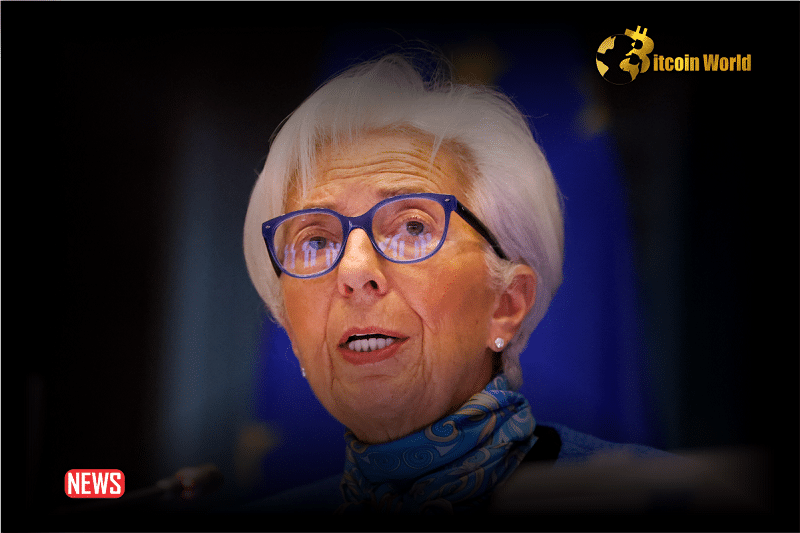Imagine a financial landscape in Europe as robust and unified as that of the United States. That’s the vision European Central Bank (ECB) President Christine Lagarde has put on the table, proposing a powerful new entity: a European counterpart to the US Securities and Exchange Commission (SEC). Is this a radical idea or a necessary step to propel Europe onto the global economic stage? Let’s dive into what this could mean for Europe and the world of finance.
Why a European SEC? Addressing Europe’s Challenges
Lagarde’s proposition isn’t just about mirroring the US; it’s a strategic move to tackle Europe’s unique and pressing challenges. What are these challenges exactly?
- Deglobalisation: In an increasingly fragmented world, Europe needs to secure its economic independence and strengthen its internal market.
- Demographic Shifts: Europe’s aging population and changing demographics require innovative financial solutions to ensure long-term prosperity.
- Decarbonisation: The urgent transition to a green economy demands massive investments, and a unified financial system can streamline the flow of capital towards sustainable projects.
Lagarde argues that a European SEC is not just a nice-to-have, but a crucial instrument to raise the significant funds required to navigate these complex issues. Think of it as upgrading Europe’s financial toolkit to handle modern economic warfare and opportunities.
Consolidating Power: Beyond a Unified Regulator
But the vision doesn’t stop at just creating a European SEC. Lagarde also advocates for consolidating Europe’s national financial exchanges. Why is this important?
Currently, Europe operates with a patchwork of national regulators and exchanges. Imagine trying to drive across a continent with constantly changing traffic laws and road signs – inefficient and often frustrating, right? A unified system, on the other hand, offers:
- Streamlined Oversight: A single European SEC would replace the current web of national watchdogs, creating a more efficient and less bureaucratic regulatory environment.
- Enhanced Capital Market Efficiency: Consolidation of exchanges would create deeper and more liquid capital markets, making it easier for companies to raise funds and for investors to participate.
- Stronger Global Position: A unified European financial market would bolster Europe’s standing in the global financial arena, making it a more attractive destination for investment.
Lagarde believes that a consolidated market infrastructure is essential for fostering a robust economic environment, creating a financial powerhouse ready to compete globally.
Read Also: US Presidential Candidate, Vivek Ramaswamy, Unveils Crypto Framework
Navigating Economic Uncertainties: Is Europe Headed for a Recession?
This ambitious proposal comes at a time when the Eurozone faces considerable economic headwinds. Recession whispers are in the air, but Lagarde urges a focus beyond just short-term growth figures. What’s the bigger picture?
While a deep economic downturn is not anticipated, modest growth around zero percent presents its own challenges. Europe is facing:
- Structural Issues: Long-term structural problems are causing Europe to lag behind other major economies.
- Economic Lag: Comparative economic data suggests Europe might trail behind competitors for years to come without significant reforms.
This economic reality underscores the urgency and importance of a centralized regulatory authority like a European SEC. It’s about building resilience and adaptability into the European financial system to weather current and future economic storms.
The short-term outlook is indeed mixed. A shallow recession is possible, but the labor market remains surprisingly tight, and there’s potential for recovery in external demand. However, high borrowing costs and a softening labor market could hinder a strong rebound. It’s a delicate balance.
Read Also: SEC Delays Verdict On Franklin and Globe X’s Bitcoin ETF Applications
Adding to the urgency, the European Commission projects potential growth to decrease to just 1.2% by 2027. This forecast highlights the critical need for decisive action and reform. Lagarde’s European SEC proposal is a bold move precisely designed to address this looming challenge.
A Bold Step Towards a Unified Financial Future
Christine Lagarde’s call for a European SEC is more than just a regulatory tweak; it’s a fundamental rethinking of Europe’s financial architecture. It’s a strategic response to a complex and evolving global landscape, aiming to create a more unified, efficient, and resilient financial market.
As Europe stands at a critical juncture, facing economic uncertainties and structural challenges, the establishment of a centralized regulatory body could be a pivotal decision. It’s about securing not just short-term stability, but long-term economic strength and prosperity for the entire region. Will Europe embrace this bold vision and forge a new path forward? The financial world is watching.
Disclaimer: The information provided is not trading advice, Bitcoinworld.co.in holds no liability for any investments made based on the information provided on this page. We strongly recommend independent research and/or consultation with a qualified professional before making any investment decisions.


